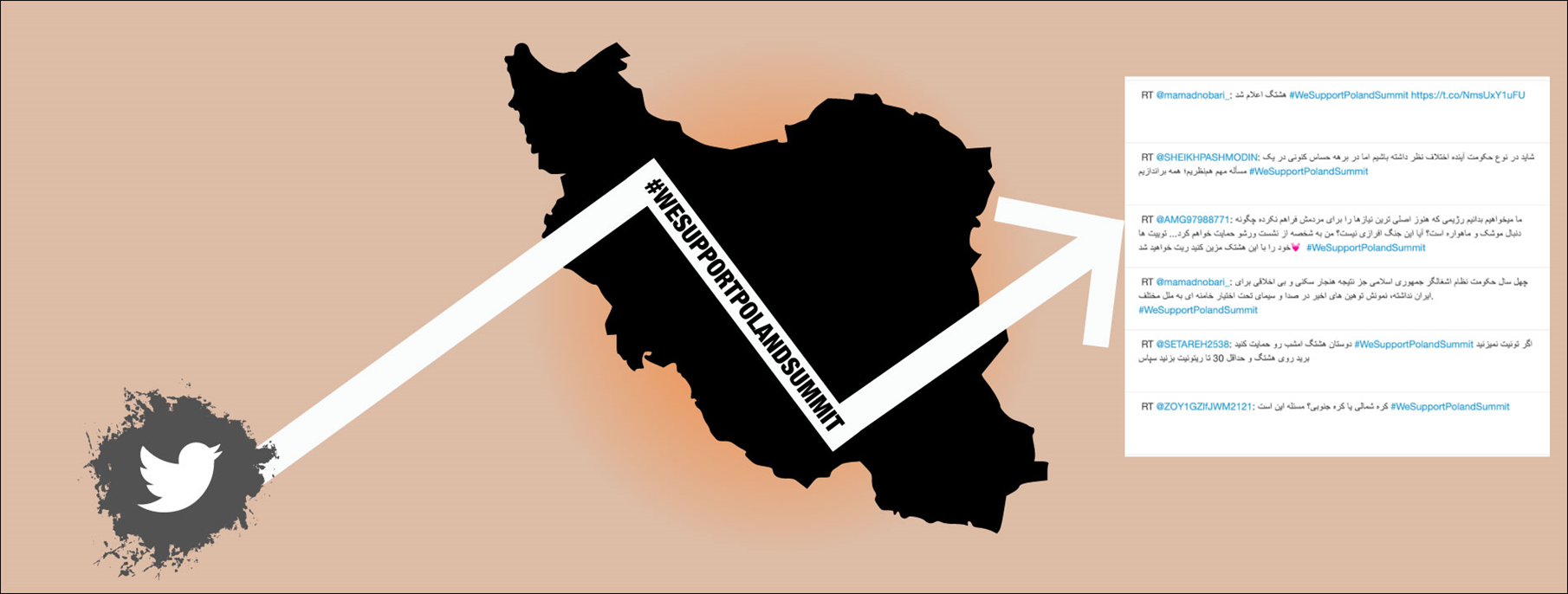Meddling in a Middle East Summit
Hashtag created ahead of U.S.-led summit on Middle East coopted by Iran-related messages
Meddling in a Middle East Summit

Hashtag created ahead of U.S.-led summit on Middle East coopted by Iran-related messages

Over a single week in January 2019, the hashtag “#WeSupportPolandSummit” experienced two short-term bursts of virality on Twitter.
@DFRLab analysis suggests that the spikes in traffic were driven by coordinated accounts opposed to the Iranian regime, rather than stemming from broad-based organic engagement.
The hashtag, previously inactive, referred to an upcoming summit to be held on February 13–14 in Warsaw. Secretary of State Mike Pompeo announced the summit on January 11, 2019. Regarding the goals of the summit, he stated “Middle East stability and peace and freedom and security… and that includes an important element of making sure that Iran is not a destabilizing influence.” The summit has been met with much anger by Iran, and one foreign ministry official referred to the conference as a “hostile act against Iran.”
Recent Spikes
#WeSupportPolandSummit had two spikes in activity in the past month, almost exclusively on Twitter. In the course of just three hours on January 15, the hashtag went from zero to 27,000 mentions per hour. By the end of the day on January 16, the activity had subsided to less than 1,000 mentions an hour. The spike in activity coincides with working hours in the United States and evening hours in Iran.

A similar peak occurred three days later, on January 19. Again, activity pertaining to the hashtag went from a very low rate (390 mentions per hour) to a much higher rate of 15,300 mentions in an hour.

For the time period of increasing engagement (in other words, the several hours before and including each of the peaks), there were 5.7 mentions per account, on average. This is more than double the number of posts per account for organically trending traffic, in which an average of well below 2.5 posts per account would be expected.
In addition, throughout the bursts of activity, 83.8 percent of the mentions of #WeSupportPolandSummit were in the form of retweets. This is unusually high for purely organic traffic, where retweets typically constitute between 50 and 75 percent of traffic.

The most active accounts mentioned the hashtag more than 10 times a minute. Of the top five accounts mentioning the hashtag in the first spike, two were again in the top five that mentioned the hashtag in the second spike.


This high-volume posting pattern is representative of inauthentic activity, in which a relatively small group of users or accounts attempts to dominate a hashtag or conversation through coordinated posting at an exaggerated rate of activity.
Narrative Origin
Approximately 84 percent of the tweets with #WeSupportPolandSummit were written in Persian, suggesting either a target audience in Iran or an intention of portraying the opinions of Iranian individuals.
We have previously reported on the amplification of tweets related to Iran and found that these practices have been used for “pushing regime messaging abroad” and efforts to “re-label Iranian state messaging, so that it can be passed on to an unsuspecting audience.”
Further investigation of the amplification of #WeSupportPolandSummit, however, indicates that it was associated with messages calling for regime change, as opposed to supporting the existing government. Approximately 2.4 percent of the mentions in the second surge that contained the hashtag were accompanied by “#IraniansWantRegimeChangeFromPolandSummit.” 1.3 percent of the mentions contained the “#IraniansWantRegimeChange.”
This messaging is reminiscent of previous efforts to amplify support of regime change by exiled Iranian opposition group Mujahedeen-e Khalq (MEK), which was removed from the U.S. Department of State’s list of terrorist organizations in 2012. The group is reported to have led disinformation campaigns on Twitter using alternative accounts and boosted hashtags including #FreeIran2018 and #IranRegimechange. There is no current indication, however, that this recent amplification effort was undertaken by MEK.
Conclusion
Ahead of an upcoming U.S.-led summit on the Middle East, the hashtag #WeSupportPolandSummit experienced dramatic and abbreviated spikes in amplification. While a single actor or coordinated effort of a network of actors is unconfirmed, the seemingly inauthentic amplification of #WeSupportPolandSummit gives cause for suspicion about the popularity of narratives regarding Iran as the summit nears.
Follow along for more in-depth analysis from our #DigitalSherlocks.

